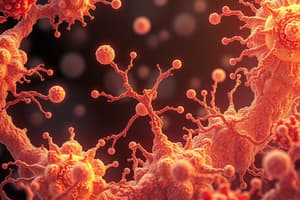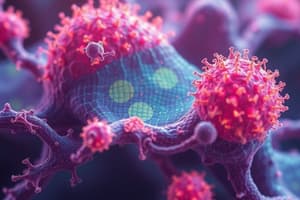Podcast
Questions and Answers
What is the study of individual cells known as?
What is the study of individual cells known as?
- Organology
- Histology
- Microscopic anatomy
- Cytology (correct)
Which level of organization involves groups of cells working together to perform a specific function?
Which level of organization involves groups of cells working together to perform a specific function?
- Organ systems
- Tissues (correct)
- Organs
- Cells
What does organology specifically study?
What does organology specifically study?
- Structure of individual cells
- The overall function of organ systems
- Groups of cells in isolation
- Organs or groups of tissues arranged in a specific pattern (correct)
What is the definition of microscopic anatomy?
What is the definition of microscopic anatomy?
Which statement correctly describes the levels of organization in the body?
Which statement correctly describes the levels of organization in the body?
What is the primary purpose of fixation in histology?
What is the primary purpose of fixation in histology?
Which technique involves using high temperatures to eliminate organic matter in cells?
Which technique involves using high temperatures to eliminate organic matter in cells?
What does differential centrifugation achieve in histology?
What does differential centrifugation achieve in histology?
Which method involves the use of beams of UV radiation to selectively irradiate areas of living cells?
Which method involves the use of beams of UV radiation to selectively irradiate areas of living cells?
The frozen section method is primarily used for which purpose?
The frozen section method is primarily used for which purpose?
Which of the following methods employs high magnification and specialized tools for mechanical operations?
Which of the following methods employs high magnification and specialized tools for mechanical operations?
What role do stains play in histology?
What role do stains play in histology?
Which observation method utilizes a phase contrast microscope?
Which observation method utilizes a phase contrast microscope?
What role do antigens play in the immune system?
What role do antigens play in the immune system?
Which component of the cell membrane is responsible for regulating its fluidity?
Which component of the cell membrane is responsible for regulating its fluidity?
What is the primary composition of the cytosol within the cytoplasm?
What is the primary composition of the cytosol within the cytoplasm?
What is one characteristic of mitochondria?
What is one characteristic of mitochondria?
Which of the following structures is NOT a part of the cytoplasm?
Which of the following structures is NOT a part of the cytoplasm?
What is the most commonly used fixative?
What is the most commonly used fixative?
Which step is performed first in the preparation of a histological section?
Which step is performed first in the preparation of a histological section?
What type of fixation is used for preserving intracellular structures?
What type of fixation is used for preserving intracellular structures?
Which procedure involves encasing tissue in paraffin wax?
Which procedure involves encasing tissue in paraffin wax?
What is the role of acidic stains in microscopy?
What is the role of acidic stains in microscopy?
Which microscope uses visible light for viewing specimens?
Which microscope uses visible light for viewing specimens?
What is a primary characteristic of the cell membrane's structure?
What is a primary characteristic of the cell membrane's structure?
What role do carbohydrates play in the cell membrane?
What role do carbohydrates play in the cell membrane?
Which cellular structure is responsible for communication?
Which cellular structure is responsible for communication?
What measurement unit corresponds to 1 micrometer?
What measurement unit corresponds to 1 micrometer?
What is the primary function of ribosomes within a cell?
What is the primary function of ribosomes within a cell?
Which structure is responsible for processing and packaging proteins received from the endoplasmic reticulum?
Which structure is responsible for processing and packaging proteins received from the endoplasmic reticulum?
Which type of endoplasmic reticulum is involved in the synthesis of steroid hormones?
Which type of endoplasmic reticulum is involved in the synthesis of steroid hormones?
What is the main function of lysosomes within a cell?
What is the main function of lysosomes within a cell?
Which component of the cytoskeleton is primarily involved in cellular movement?
Which component of the cytoskeleton is primarily involved in cellular movement?
What type of transport requires energy to move substances across the membrane?
What type of transport requires energy to move substances across the membrane?
What is the primary role of peroxisomes in cells?
What is the primary role of peroxisomes in cells?
Which of the following best describes the nuclear envelope?
Which of the following best describes the nuclear envelope?
During which phase of mitosis do chromosomes align at the cell's equator?
During which phase of mitosis do chromosomes align at the cell's equator?
What term describes the process by which water moves across a selectively permeable membrane?
What term describes the process by which water moves across a selectively permeable membrane?
Which of the following is not a component of the cytoskeleton?
Which of the following is not a component of the cytoskeleton?
What differentiates rough endoplasmic reticulum from smooth endoplasmic reticulum?
What differentiates rough endoplasmic reticulum from smooth endoplasmic reticulum?
What structure is essential for chromosome organization during cell division?
What structure is essential for chromosome organization during cell division?
What are the basic structural units of chromatin called?
What are the basic structural units of chromatin called?
Study Notes
Introduction to Cell Structure and Functions
- Basic unit of life is the cell; all living organisms are composed of one or more cells.
- Cytology refers to the study of individual cells, while histology examines tissues using a microscope.
- Organology focuses on studying organs made up of tissue groupings.
Levels of Organization
- The human body consists of cells, tissues, organs, and organ systems, each with specific roles in maintaining homeostasis.
- Cells are the smallest units capable of independent existence.
Histological Methods
- Direct observation techniques include the use of phase contrast microscopes.
- Cell, tissue, and organ cultures allow for detailed study of structural and functional properties.
- Mechanical micromanipulation involves high magnification techniques for examining cells.
- Differential centrifugation isolates cell components like nuclei and mitochondria.
Preparation of Histological Section
- Fixation preserves tissue structure, commonly using formalin.
- Dehydration immerses tissue in increasing concentrations of alcohol.
- Clearing chemicals (e.g., xylol) render tissues transparent before embedding in paraffin wax.
- Sectioning utilizes a microtome to cut thin slices for examination under a microscope.
Staining Techniques
- Hematoxylin and Eosin are standard stains used for histological observation.
- Stains can be categorized as acidic, basic, or neutral based on their behavior in the tissue.
Microscopy Measurement Units
- Uses SI units; micrometers and nanometers are standard measurements in microscopy.
Optical Microscopy
- Various types include phase contrast, fluorescence, darkfield, and electron microscopy, each serving different purposes for cell study.
Cell Structure
- The cell is the basic morphological and functional unit, with eukaryotic and prokaryotic classifications.
- Cell functions include metabolism, synthesis of molecules, communication, and reproduction.
Cell Membrane
- Composed of a trilaminar structure providing protection and selective permeability.
- Proteins embedded in the membrane facilitate communication and transport.
- The fluid mosaic model depicts how lipids and proteins are in constant motion.
Cytoplasm
- Contains organelles, inclusions, and fibrillar elements for structural support.
- Organelles like mitochondria generate energy, while ribosomes are the site of protein synthesis.
Organelles Overview
- Mitochondria are energy-producing organelles abundant in active cells.
- Endoplasmic reticulum (ER) is classified as rough (with ribosomes) or smooth (for lipid synthesis).
Golgi Complex
- Processes and packages proteins from the ER; consists of cisternae and vesicles.
Lysosomes and Peroxisomes
- Lysosomes contain enzymes for digestion, while peroxisomes handle metabolic reactions.
Centrosomes and Microtubules
- Centrosomes organize microtubules essential for cell division and the formation of cilia.
Nucleus Structure
- The largest cell structure housing the genetic material; composed of nuclear envelope, chromatin, and nucleolus.
- Chromatin condenses into chromosomes for mitosis; human cells contain 46 chromosomes.
Cell Reproduction
- Mitosis involves several phases: prophase, metaphase, anaphase, and telophase.
Movement Across Cell Membrane
- Passive transport mechanisms include diffusion, osmosis, facilitated diffusion, and filtration, all operating without energy.
- Active transport requires energy to move substances against concentration gradients, encompassing endocytosis and exocytosis processes.
Studying That Suits You
Use AI to generate personalized quizzes and flashcards to suit your learning preferences.
Related Documents
Description
Test your understanding of the basic unit of life with this quiz on cell structure and functions. Gain insights into histology and explore the ultrastructure and functions of cells, alongside histological images. Perfect for students beginning their journey into the world of cellular biology.




